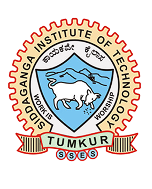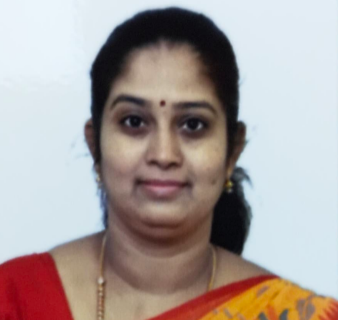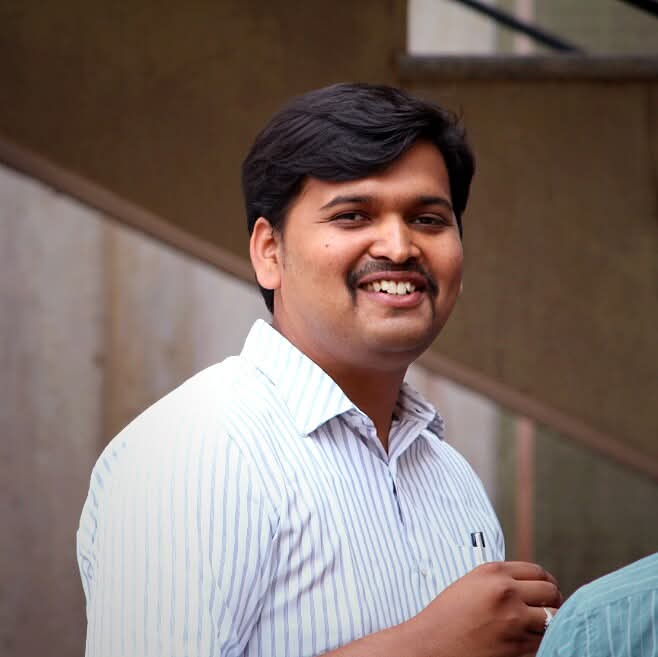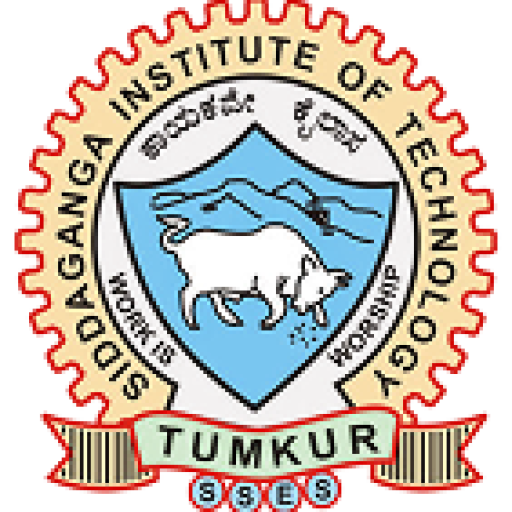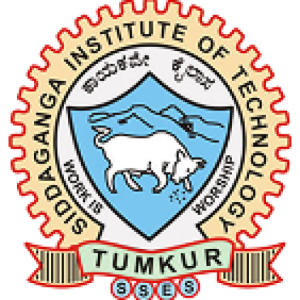Department of Electronics & Instrumentation Engineering
Overview
Department of Electronics & Instrumentation Engineering was established in 1979 offering BE degree course in Instrumentation Technology. Later the department was renamed as Department of Electronics and Instrumentation Engineering in the year 2014. The department is offering UG and PG programs. The department is recognized as research centre by VTU to offer Ph.D and MSc (Engg) since 2006. There is provision for working professionals to pursue PG in VLSI Design and Embedded systems.
The UG program is accredited twice under TIER-I by NBA.
The department has experienced and qualified faculty members. 85% of the faculty members are Ph.D holders. Faculty members are actively pursuing research in the areas of Materials, Thin film sensors, Bio-medical signal processing and VLSI design. the department has state of the art thin film laboratory for research in thin films. Faculty members are pursuing research projects funded by national and state funding bodies such as GTRE, DST-FIST, VGST and Secure Machines. Seven Ph.Ds are produced from the research centre.
Program Details
The department offers a
- UG program in Electronics and Instrumentation Engineering with an intake of 60 students,
- PG program in VLSI Design and Embedded Systems with an intake of 12 students, and
- Ph.D. program in Electrical and Electronics Engineering Sciences.
Vision & Mission
Vision
To become a premier Electronics and Instrumentation Engineering Department by imparting quality education in the fields of electronics, instrumentation and cutting edge technologies developing competence to meet industrial norms and to pursue research and innovation contributing to socioeconomic development.
Mission
The Department is committed to
- Develop competent professionals by offering industry aligned curriculum in Electronics, Instrumentation and VLSI and embedded systems along with an exposure to cutting edge technologies by providing best in class learning, promoting interdisciplinary research and innovation catering to industrial and societal needs.
- Encourage and prepare students for higher studies to promote lifelong learning.
- Imbibe professional ethics and skills in students to provide engineering service to the society.
- Collaborate with industries to inculcate industry readiness, creativity, managerial competence, experiential learning and entrepreneurship skills.
Student Life & Activities
BRIDGE COURSES CONDUCTED
- Workshop on Computer vision and image processing applications using MATLAB and Vivado ( 24th -28th March 2025) in collaboration with CoreEL Technologies for 6th semester students
- Hands-on session on IOT using MATLAB, Simulink and Thingspeek (26th & 27Th August 2024) in collaboration with CoreEL Technologies for 2nd semester PG students
- Five days bridge course on “Industrial IoT” organized by Department in association with IIOT Expert, Whitefield, Bangalore, 17th– 21st April 2023.
INDUSTRY VISITS
- 5th semester students visited Dairy Classic Ice creams Pvt. Ltd., Bangalore on 4th Jan 2025
- 7th semester students visited JSW cement Pvt., Ltd., Vijayanagara, Bellary on 15th Dec 2023.
- 4th semester students visited URSC, Bengaluru on 04th April 2025.
Infrastructure & Facilities
The department is equipped with:
- Automation & Control Lab – Equipped with PLC, SCADA, and robotics kits.
- Embedded Systems Lab – Focused on microcontrollers, IoT, and real-time systems.
- Precision Instrumentation Lab – Covers high-accuracy sensors and measurement systems.
- Thin Film Laboratory– Focused on fabrication, characterization, and analysis of thin films and coatings
- Embedded Systems Lab.
- Digital Signal Processing.
- Virtual Instrumentation Lab.
- Process Instrumentation Lab.
- Process Automation lab.
- Analog Electronics Circuits lab.
- Digital Electronics Circuits lab.
- Project lab.
- Industry supported lab.
- Thin Film lab (Research).
- Library.
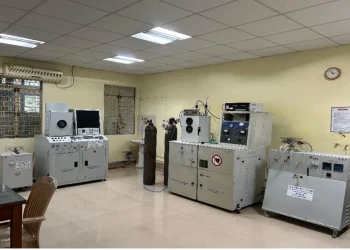
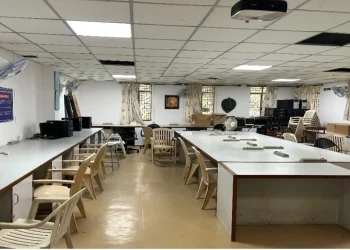
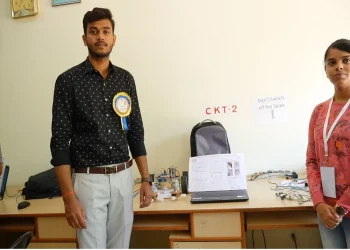
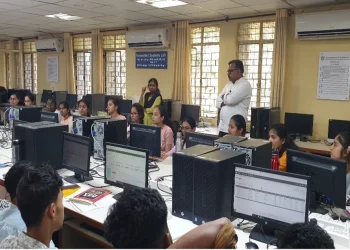
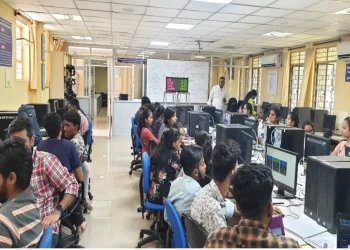
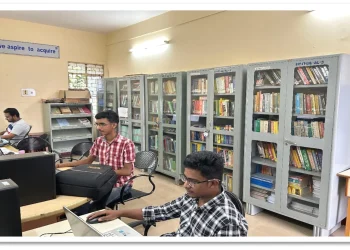
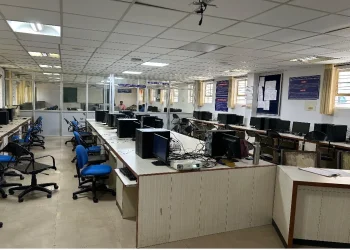
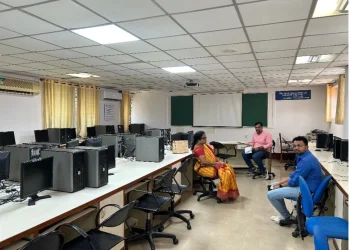
Faculty
The department comprises highly qualified faculty members specializing in control systems, embedded technology, industrial automation, and robotics. Faculty members actively engage in research and industry collaborations.
No. of Ph.D’s: 10
Pursuing PhD: 02
No. of Masters: 01
Total no. of Professors (Faculty’s): 13
Areas of Faculty Expertise
Faculty members of EIE have expertise in the following Research domain
- Materials and Thin film sensors
- Biomedical signal processing
- VLSI design
Academic Programs & Syllabus
- Undergraduate Program:
- B.E. in Electronics and Instrumentation Engineering – A comprehensive 4-year program covering principles of electronics, sensors and transducers, control systems, industrial instrumentation, signal processing, microcontrollers, embedded systems, VLSI design, process automation, and measurement techniques for developing intelligent instruments and advanced control systems.
- Postgraduate Program:
- M.Tech in VLSI and Embedded System – A specialized 2-year program focusing on advanced concepts of Very Large Scale Integration (VLSI) design, digital and analog IC design, FPGA-based system development, embedded system architecture, real-time operating systems, hardware–software co-design, and system-on-chip (SoC) technologies for high-performance electronic and automation applications.
- Ph.D. Program:
- Research opportunities in Materials and Thin Film Sensors, biomedical instrumentation and IoT-based solutions.
Syllabus
Program Educational Objectives (PEOs)
PEOs - UG
PEO 1: Contribute effectively in industry and excel in higher education by applying the knowledge of Science, Technology, Engineering and Math (STEM) principles.
PEO 2: Engage in lifelong learning by adapting emerging technologies and excel in research pursuits and entrepreneurs to meet global challenges.
PEO 3: Exhibit professional skills, communication skills, teamwork and leadership qualities, imbibing ethical values in their profession for the benefit of society.
PEOs - PG
PEO 1: To build their career in the core industry, public sector or multinational corporations, in the domain of VLSI Design and Embedded systems.
PEO 2: To engage in lifelong learning, excel in research pursuits and entrepreneur in technologies related to VLSI and Embedded Systems to meet the global challenges.
PEO 3: To consistently exhibit professional and ethical values, communication skills, team work and leadership quality in their profession for the benefit of the society.
Program Outcomes (POs)
POs - UG
- PO1: Engineering Knowledge: Apply knowledge of mathematics, natural science, computing, engineering fundamentals and an engineering specialization to develop the solution of complex engineering problems.
- PO2: Problem Analysis: Identify, formulate, review research literature and analyze complex engineering problems reaching substantiated conclusions with consideration for sustainable development.
- PO3: Design/Development of Solutions: Design creative solutions for complex engineering problems and design/develop systems/components/processes to meet identified needs with consideration for the public health and safety, whole-life cost, net zero carbon, culture, society and environment as required.
- PO4: Conduct Investigations of Complex Problems: Conduct investigations of complex engineering problems using research-based knowledge including design of experiments, modeling, analysis & interpretation of data to provide valid conclusions.
- PO5: Engineering Tool Usage: Create, select and apply appropriate techniques, resources and modern engineering & IT tools, including prediction and modeling recognizing their limitations to solve complex engineering problems.
- PO6: The Engineer and The World: Analyze and evaluate societal and environmental aspects while solving complex engineering problems for its impact on sustainability with reference to economy, health, safety, legal framework, culture and environment.
- PO7: Ethics: Apply ethical principles and commit to professional ethics, human values, diversity and inclusion; adhere to national & international laws.
- PO8: Individual and Collaborative Team work: Function effectively as an individual, and as a member or leader in diverse/multi-disciplinary teams.
- PO9: Communication: Communicate effectively and inclusively within the engineering community and society at large, such as being able to comprehend and write effective reports and design documentation, make effective presentations considering cultural, language, and learning differences
- PO10: Project Management and Finance: Apply knowledge and understanding of engineering management principles and economic decision-making and apply these to one’s own work, as a member and leader in a team, and to manage projects and in multidisciplinary environments.
- PO11: Life-Long Learning: Recognize the need for, and have the preparation and ability for i) independent and life-long learning ii) adaptability to new and emerging technologies and iii) critical thinking in the broadest context of technological change.
POs - PG
- PO1 (Team Work): An ability to independently carry out research/investigation and development work to solve practical problems.
- PO2 (Communication): An ability to write and present a substantial technical report/document.
- PO3 (Scholarship of Knowledge): Students should be able to demonstrate a degree of mastery over the area as per the specialization of the program. The mastery should be at a level higher than the requirements in the appropriate bachelor program.
- PO4 (Problem Solving): The student will be able to think and solve engineering problems, evaluate a wide range of potential solutions for those problems, and arrive at feasible/optimal solutions.
- PO5 (Usage of Modern Tools): The student will be able to apply modern engineering tools, equipment, and techniques to model and predict complex engineering problems with an understanding of the limitations.
- PO6 (Project Management): The student will demonstrate knowledge and understanding of engineering and management principles and apply the same to one’s own work, as a member and leader in a team, to manage projects efficiently and economically.
- PO7 (Life-long Learning): The student will be able to recognize the need for, and demonstrate the ability to engage in lifelong learning independently with a high level of enthusiasm and commitment to improve knowledge and competency continuously.
Programme Specific Outcomes (PSOs)
- PSO1: Apply the technical knowledge to analyse, design, and implement VLSI system and apply advanced concept in the field of semiconductor and emerging technologies.
- PSO2: Apply the knowledge of embedded system and Programming Skills to design electronic system for real time applications.
Industry Collaboration & Placement
The department has strong industry partnerships, providing students with internships, projects, and placements.
- Collaboration with CSIR lab, Bengaluru : For Research guidance and joint publications
- Collaboration with Honeywell Technology Solutions, Inc. Bengaluru : For Research guidance and joint publications
- Collaboration with SM Electronics: Project work and Internship for PG and UG students
- Collaboration with iMEDRIX : Project work for UG students
- Collaboration with Secure Machines : Project work for PG students and industry sponsored research
Industry Research Work:
- FPGA based PLL design sponsored by Secure Machines Pvt. Ltd. Bengaluru (on going)
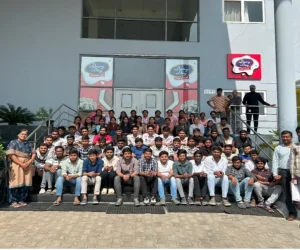
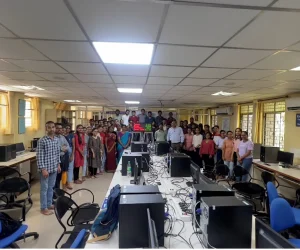
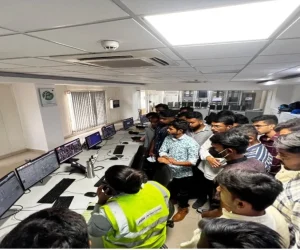
Achievements & Recognition
- Recognized for research excellence in Material and Thin Film Sensors.
- 80% of students secure placements in top industries, while others pursue higher education.
- Faculty and students have published research papers in reputed Journals and Conferences
- Group of 4 student’s team from last year of batch 2025 won 1st Prize at FKCCI’s 17th Edition of MANTHAN 2025, securing ₹3 Lakhs among 560+ teams across Karnataka depending the business plan presented on the topic “EcoReactor – CO₂ Monitoring & Bioconversion System”, a sustainable innovation recognized for its environmental and economic impact.
- National level hurdle player and EIE Department 8th sem student Mr. Krishik M Represented Karnataka around 6 times in National level competitions and was recognised by karnataka government as LOKA SABHA Elections ambassador under sports section to Tumakuru in 2024-25.
- He was awarded with Rs 10 lakhs by Karnataka government to support financially for OLYMPICS 2024.
- Won gold medal in 110m hurdles at 26th VTU Athletic Championship 2024-25.
- Representing Country at Senior SAF Games 2025 in athletics (Hurdle).
- 8th Sem student Mr. Harsha S M won a Silver medal in 110m hurdles at 26th VTU Athletic Championship 2024-25.
- 8th Sem student Ms.Sinchana S selected as referee in U – 19 PU state Taekwondo selection conducted in Haveri on 6 December 2024.
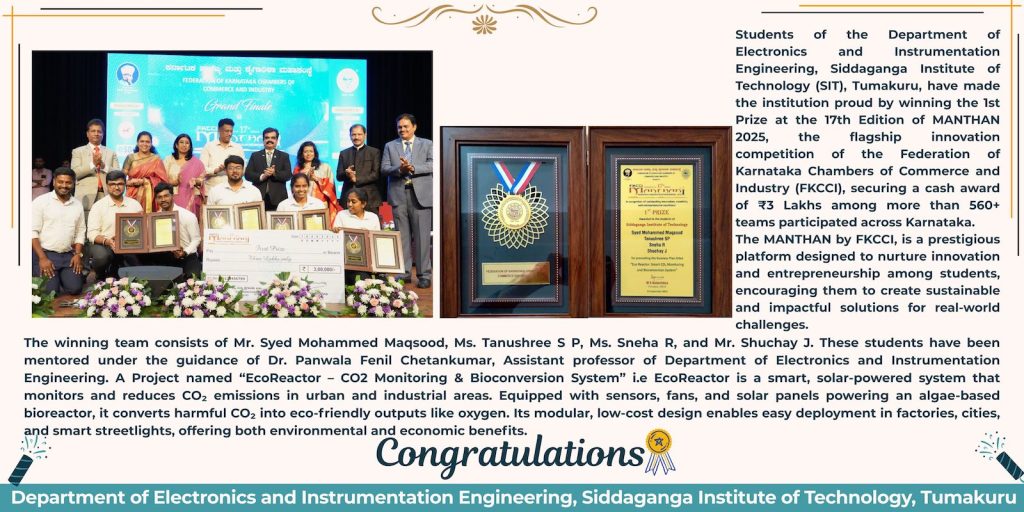
Participation of students in co-curricular activities
| Sl. No. | Event | Title of the Project | Award |
|---|---|---|---|
| 1 | Seminar and Exhibition held at VTU, Belagavi on 12th and 13th August 2022 | Water Pollution Monitoring Boat using IoT | Best Project of the Year award for the student project |
| 2 | Student Design Contest in International Conference On Micro, Nano and Smart Systems (IC-MNSS) 2024 | Smart Crop prediction, Monitoring and Controlling for Sustainable farming using AI and ML | Cash prize of Rs.5000 |
| 3 | International Conference on Recent Advances in Science and Engineering Technology (ICRASET-2023) | Automated Water Monitoring and Regulation System using Internet of Things | Best Paper Award |
| 4 | International Conference on Recent Developments in Mechanical Engineering (ICRDME-2022) | Agricultural pest and disease detection in Banana plant | Best Paper Award |
| 5 | Technisium-2024, Siddaganga Institute of Technology | Development of Si-based capacitive sensor for Fungus detection | Best Project Award |
| 6 | Student Project Programme - 47th series (KSCST) | Automatic Sugarcane bud cutting using image processing | Participated |
papers published (Last 3 years):
Peer-reviewed journal Papers: 25
International Conference Papers: 48
Patents filed: 01(Granted)
Industry collaboration,
Student placements (Last 3 years):
131 students have placed
SWAYAM NPTEL:
Many faculy members have received Topper, Gold+Elite, Silver+Elite, and Elite grades in Swayam-NPTEL certificate course.
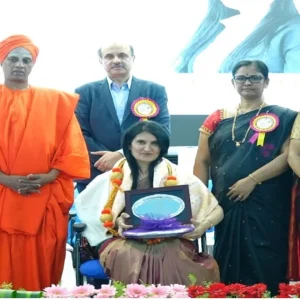
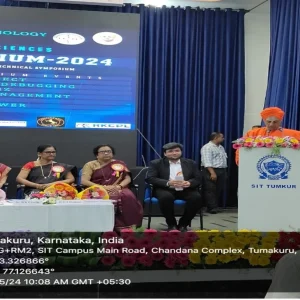
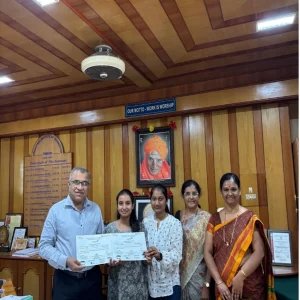
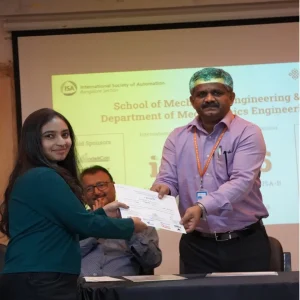
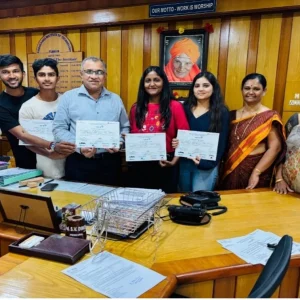
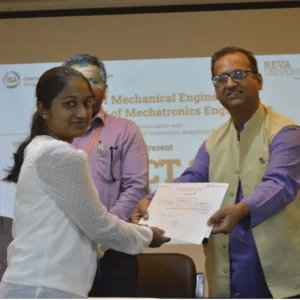
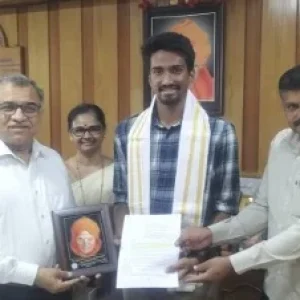
Alumni Success
Our alumni work in leading industries, research labs, and government organizations, contributing to automation and precision instrumentation worldwide.
Admissions
Admissions for B.E. in Electronics and Instrumentation Engineering are available through CET, COMED-K, and JEE Mains. Postgraduate admissions are based on academic qualifications and research interests. For more details, visit the Admissions Page.
